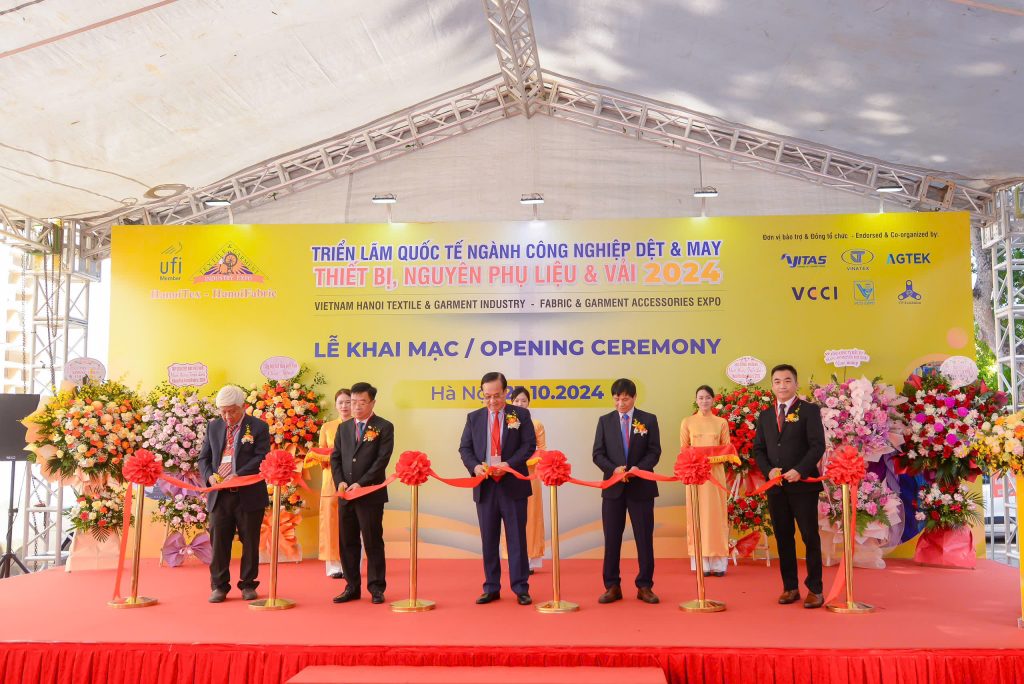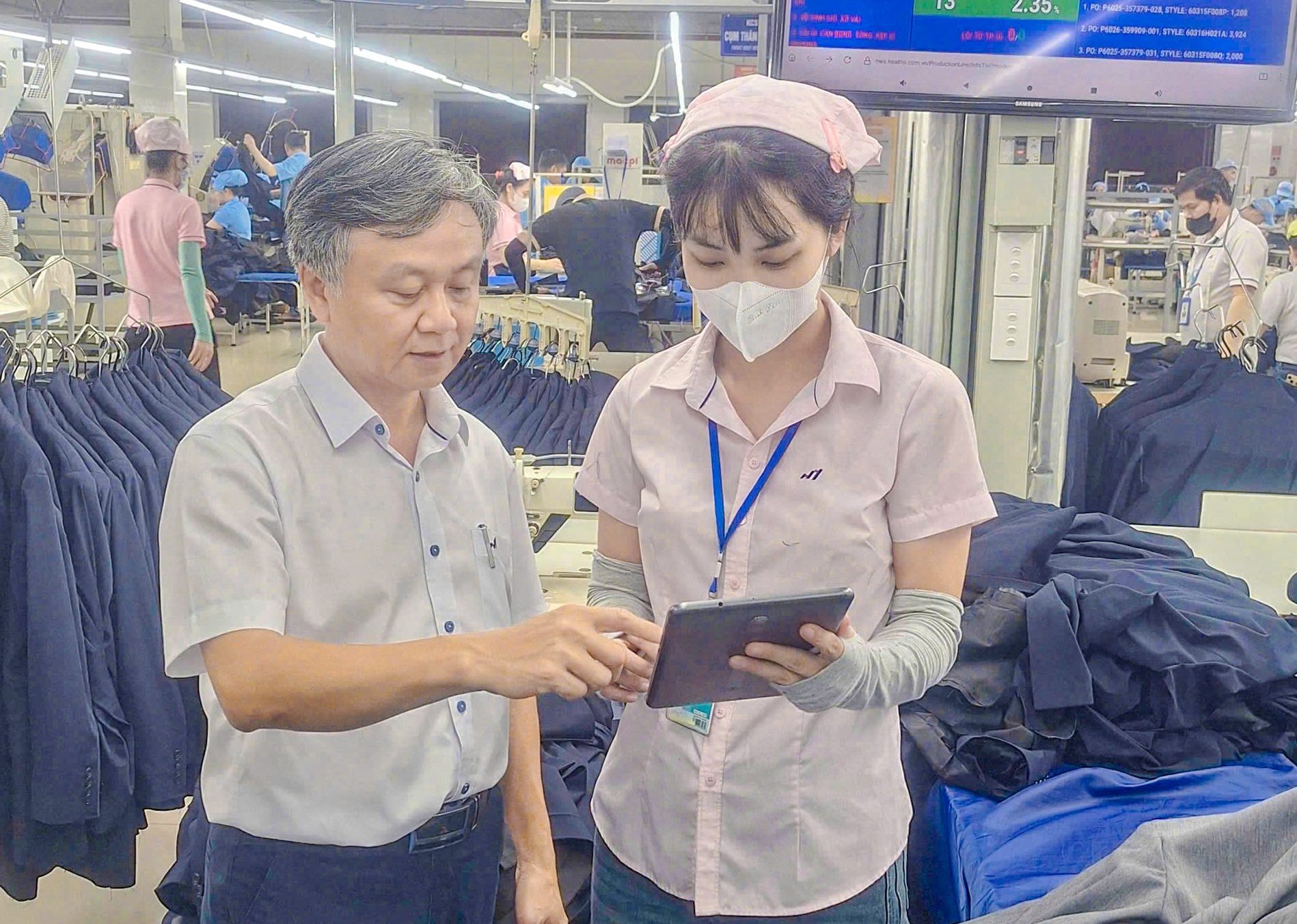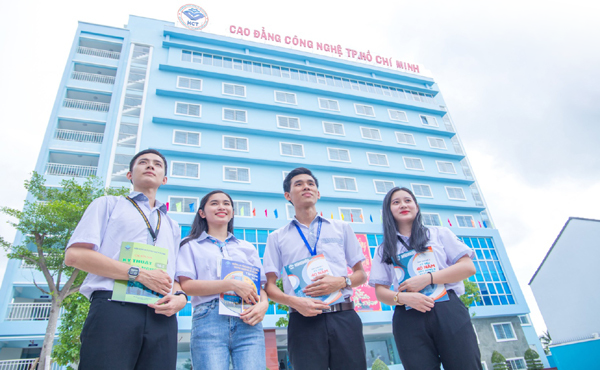The Vietnam National Textile and Garment Group (Vinatex) currently employs nearly 65,000 workers across its member units, with an average monthly income of over VND9.4 million per person. Over the years, Vinatex’s success has been closely linked to the commitment to improve the quality of life, income, and working conditions for their workers, even during challenging periods such as the COVID-19 pandemic and the economic downturn in 2023. As a result, textile garment workers have become increasingly dedicated to their jobs, eager to compete and enhance productivity and quality, thereby contributing to elevating the company’s brand.
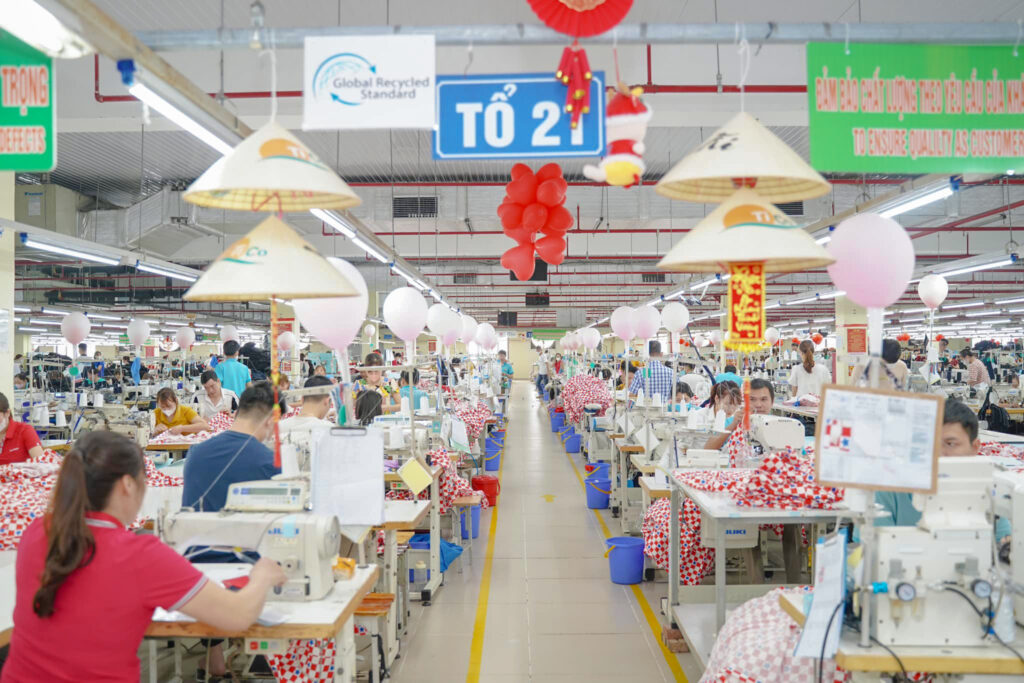
Enhancing Workforce and Productivity
Amidst a challenging environment, the Garco 10 Corporation (Garco 10) is among the few that have maintained employment and ensured employee income despite the wave of layoffs and personnel cuts in the post-COVID-19 period. Garco 10 has proactively sought more job sources and markets beyond their traditional ones and organized supplementary training for employees. Garco 10 is one of the few companies with welfare facilities serving both employees and the community, including kindergartens, medical rooms, Vocational Colleges, supermarkets, restaurants, hotels, dormitories, and cultural centers for workers, etc.
At Hoa Tho Textile and Garment Joint Stock Corporation (Hoa Tho), employee welfare, creativity competitions, and promotion of improvements have always been prioritized alongside business development. Mrs. Tran Tuong Anh, Deputy General Director of Hoa Tho stated that the corporation consistently cares for employees’ jobs and promptly implements social welfare programs. All distant employees receive housing and childcare subsidies. Additionally, Hoa Tho has established a health station equipped with essential medical devices to meet onsite medical needs. Annually, Hoa Tho conducts two health check-ups for all workers and cancer screenings for females.

Similarly, Mr. Nguyen Tien Hau, Deputy General Director and Chairman of the Trade Union of Hue Textile and Garment Joint Stock Company (HUGATEX) noted that all workers are provided with personal protective equipment suited to their specific jobs and working environments. The company has improved working conditions by repairing and maintaining infrastructure, upgrading cooling, ventilating, and air conditioning systems, and investing in modern equipment and automation to reduce manual labor, ensure safety, and increase productivity.
Mr. Do Van Thuan, Chairman of the Trade Union of Tien Hung Joint Stock Company (Tien Hung JSC), stated that the company’s labor safety practices have been highly appreciated by various organizations, such as Better Work program, Lab, and Hanoi Industrial Textile Garment University. Currently, the company is collaborating with Better Work program to train employees in fire protection and prevention, electrical safety, and equipment operation safety. As a result, workers’ awareness has significantly improved. The company now uses air conditioning systems instead of water spray systems to cool the workshops.
“Every year, the company organizes vacation trips for employees to rest and re-production of labor power. Customers highly value Tien Hung’s welfare policies, salaries, bonuses, working conditions, and social responsibility. Many of these policies exceed legal requirements, such as gasoline allowances and holiday gifts, resulting in a stable and consistent workforce,” Mr. Do Van Thuan explained.
Speaking about Tien Hung’s working conditions, Ms. Pham Thi Nga, Team Leader of Team 45 at Garment Workshop 5, Tien Hung JSC, shared: “Currently, working conditions are excellent and continuously improving. The company has upgraded the workshop, invested in modern machinery, and run air conditioning continuously. During hot summers, the company has also provided cool drinks and snacks like black bean sweet soup, green bean sweet soup, lemon water, yogurt, coffee, and smoothies. Working conditions at the company are better than at home for many workers. With a monthly income of over VND10 million, we feel secure in providing for our families. Most employees do not want to work elsewhere due to the good benefits, rights, income, and working conditions. Even young workers, who often change jobs frequently, intend to stay with the company long-term.”
Prioritizing Meals to Ensure Employee Retention
Alongside ensuring benefits and policies for employees, companies within the Group always pay attention to the quality of meals, ensuring food safety and nutrition for their workers.
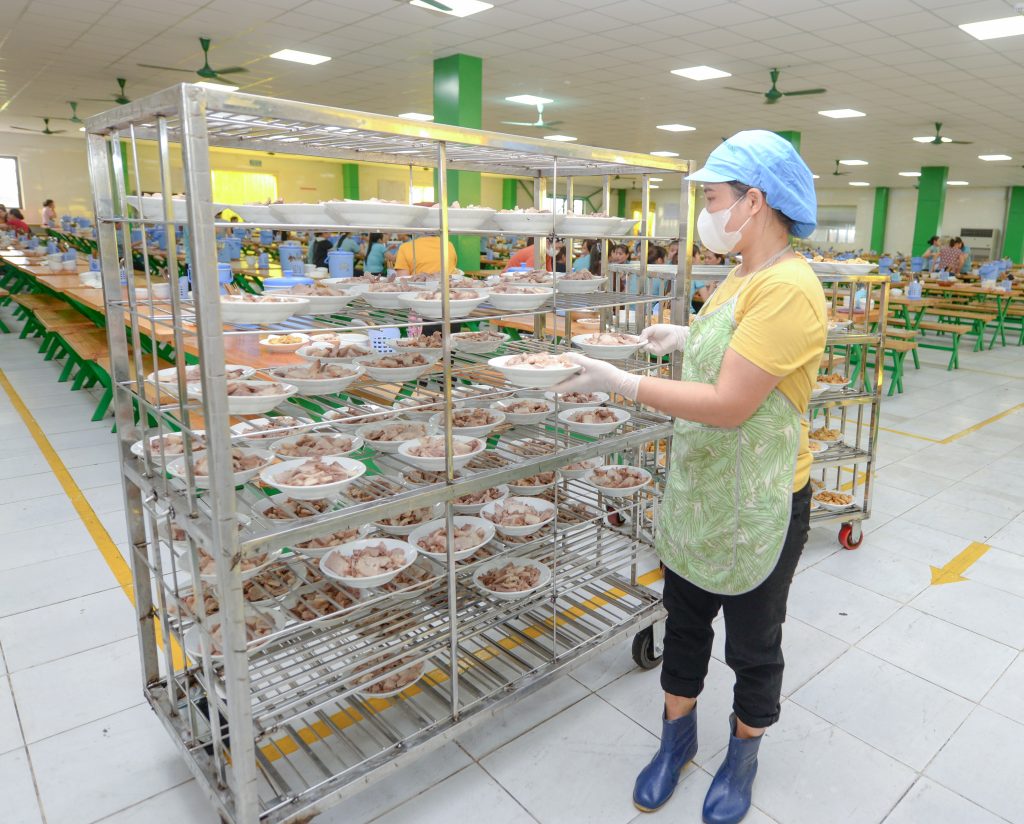
Ms. Nguyen Thi Dao, Chairwoman of the Garco 10 Trade Union, stated that in May, the union provided an additional fresh meal with nutritious dishes such as steamed chicken, fried meat, mixed stir-fried vegetables, bone marrow soup, and fruit for all employees across the system. The Garco 10 Trade Union believes that ensuring nutritious and safe meals will provide employees with the health and comfort needed to work effectively, thereby increasing labor productivity and work quality.
At Garco 10, the menu changes daily and weekly, offering a variety of dishes that are publicly announced to the workers. Each meal includes the four main food groups: carbohydrates, protein, fats, vitamins, and minerals (vegetables, fruits). The kitchens source food from reputable suppliers with food safety certificates. Fresh ingredients are used to prepare meals immediately, providing hot and delicious food compared to industrial meals ordered from outside. Additionally, Garco 10 has established a process for controlling meal provision, food safety, and preventing collective food poisoning across the system. Following recent collective food poisoning incidents in some provinces, Garco 10 has instructed kitchens to eliminate ready-to-eat, easily contaminated foods like sausage, fresh bamboo, and pickled vegetables, ensuring fresh, cooked foods with adequate nutrition.
At Hoa Tho, employees can register for a free breakfast buffet with a diverse menu, including banh beo, banh goi, banh mi, banh bot loc, fish or meat noodles, Quang noodles, sticky rice, mixed noodles, from 6:00 to 7:15 am. For lunch, the company serves a menu of four dishes, including two main dishes, one stir-fried dish, and one boiled vegetable dish, along with rice and soup, or employees can register for noodles or soup to vary their meals. For those working overtime, the company provides noodles or soup at 5:00 pm. Night shift yarn workers receive free meals such as curry, noodle soup, and pho. The yarn workers also have been provided free beverages and coffee in the factory’s coffee room.
“During the hot summer months, to increase resistance and strength for employees, the corporation leadership has directed the kitchen to collaborate with units to provide free cooling drinks like lemon water, sugarcane juice, bean soup, and yogurt on Mondays, Wednesdays, and Fridays. Hoa Tho serves 3,200 lunch meals and 1,500 breakfast meals daily, so food safety and hygiene are always a top concern of the company. Every day, medical staff inspect the food sources, record the results, and evaluate them. Food samples are kept according to regulations, and the corporation invites food safety experts from the Da Nang Food Safety Authority periodically to train all kitchen staff and update related regulations,” emphasized Mrs. Tran Tuong Anh.
Additionally, Hoa Tho conducts regular inspections at off-site kitchens and frequently monitors the input food sources at kitchens to ensure food standards with invoices, food safety certificates, and competitive prices. Thang Binh Yarn Factory even grows some clean vegetables for workers. The factory also focuses on improving the working and resting environment for employees, with a coffee area featuring a Koi fish pond and green garden, creating a relaxing space during breaks. The canteen is equipped with fans and air conditioning, offering free coffee, soft drinks, movie screenings, and music during breaks. The medical department actively monitors and updates the situation of seasonal diseases, providing health guidance and prevention tips for employees.
At Hue Textile and Garment Joint Stock Company, Chairman of the Trade Union Nguyen Tien Hau shared: “All employees receive company-supported industrial meals during shifts at rates of VND18,000 per meal for shifts 1, 2, and administrative hours, and VND 24,000 per meal for shift 3. The menu is designed to ensure adequate nutrition for employees. All food comes from reputable suppliers with clear origins, ensuring food safety. The cooking area is safe and hygienic, with all cooking equipment properly arranged. Cooking staff are regularly trained in food safety. Drinking water is tested monthly to ensure safety and quality.”
Tien Hung Joint Stock Company consistently improves and provides the best conditions for employees to feel secure in their work. The menu is continuously updated weekly. “To ensure food safety, the company has agreements with reputable suppliers certified for safety. Provincial authorities regularly inspect the company’s food safety practices. Every Friday, the supervisory team meets to plan the menu for the following week. In summer, the menu is adjusted accordingly, and employees receive free cool drinks, milk, and supplements. The company always listens to employee feedback to ensure meals are suitable and of high quality,” emphasized Chairman of the Trade Union Do Van Thuan.
Ms. Tran Thi Quyen, Tien Hung JSC kitchen staff, shared: “I have been working in the company’s kitchen for nine years. The kitchen team has about 20 members, and we start working at 7 am every day to prepare meals for the workers until around 12:20 pm. To ensure food safety, we choose reliable suppliers and regularly clean the kitchen, carefully process ingredients, and follow proper procedures for washing vegetables and other foods. We continuously clean dining tables and floors. When serving cooked food, we always wear gloves and masks to ensure hygiene. Since the company began operations, there have been no food poisoning incidents, but we always prioritize food safety and nutritional quality for the workers’ meals.”
Dr. Nguyen Huy Tuan – Occupational Medicine Department, Textile Garment Hospital Medical Center
To prevent occupational diseases, workers and employers should implement the following measures:
- Providing protective equipment and maintaining workplace hygiene to ensure sanitary conditions free from harmful and hazardous factors for workers.
- Adhering to safety regulations.
- Conducting regular environmental monitoring.
- Participating in regular health check-ups and screenings for occupational diseases.
- Using personal protective equipment correctly.
- Establishing a balanced diet and reasonable rest schedule.
To minimize the risk of food poisoning, adhere to the following 10 principles published by WHO:
Principle 1: Principles of Choosing safe
Principle 2: Cook food thoroughly
Principle 3: Eat immediately after cooking
Principle 4: Carefully store cooked food
Principle 5: Reheat food thoroughly before eating
Principle 6: Do not mix raw and cooked food
Principle 7: Always keep your hands clean when processing food
Principle 8: Always keep processing surfaces and kitchen dry and clean
Principle 9: Protect food from the invasion of insects, rodents, and other animals
Principle 10: Use clean water
Reporters
Translated from the article published in the June 2024 issue of Textile-Garment and Fashion Vietnam Magazine.


